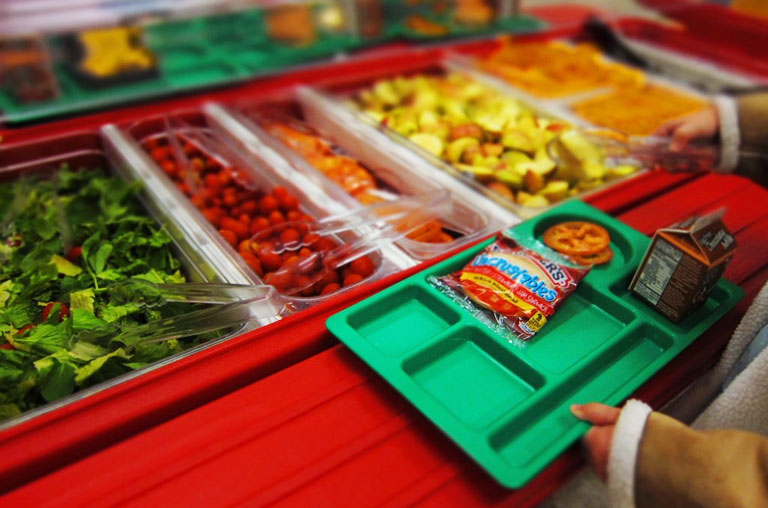A Litterless Lunch: The Guide to Taking Sensible and Necessary Steps to Make Your School Lunch Sustainable
December 5, 2018
Everybody Eats!
In the midst of the world’s most time sensitive issue, global warming and climate change, it is time for students and leaders of the future to take steps to reduce our carbon footprint and extend the longevity of the planet.
There are different aspects of our school lunch that need attention, and paying mind to them can help us take that first step.
Start with eliminating the usage of paper during lunch. It has been determined by scientistdirect.com that all the paper wasted annually could add up to a 12 foot high wall from New York to California. Using a paper bag is a single use daily habit that needs to be broken. Carry a reusable lunchbox or lunch bag instead and avoid paper bags. It can be argued that purchasing a lunch box is more costly than a cheap paper bag, but the cost of consistently buying paper bags will exceed the purchase price of a lunchbox or lunch bag. Remember that there are multiple prints and sizes, and the fun is finding what style reflects you albeit a team sport or floral pattern.
Another item to start bringing to school are cloth napkins. It is advised to switch to reusable, washable cloth napkins at home as well. Simply put your cloth napkin back in your lunch bag at end of your meal and leave it to be clean along with your laundry pile at home. It takes up very minimal space when time for washing.
Next, drop the plastic. Constantly purchasing ziploc bags that rip, leak, and run out is not sensible. Switch to reusable sandwich and snack containers. Multiple stores everywhere from Target to Dollar Tree offer a variety of sizes, styles, and colors. These get washed in minutes and are ready to use the next day allowing you to save money and the environment. Just note, if clean, ziplocs can be recycled along with other plastic bags in specific recycling plastic bins. These can be found in most food market places, such as Shoprite. Before you use another ziplock bag, it is important to note, according to ecowatch.com, approximately 500 billion plastic bags are used worldwide annually and more than one million bags are used every minute.
As for utensils, avoid the shameful plastic cutlery offered by the school and bring your own spoons, forks, and knives. This may seem extra, but it is a necessary step. Many utensils come in packaged sets and can be found online and in store. A misfortunate reminder is that several chemicals compounded in plastic can be absorbed by the human body, and have been linked to hormone irregularities, and health effects. In fact, 93% of Americans age six or older test positive for BPA, a chemical in plastic (ecowatch.com).
Additionally, it is extremely recommended that you purchase a reusable bottle in substitute to the plastic bottles that are purposed once and rarely recycled. To refute the mindset that bottled water is more pure than the water refilled in our school fountains, understand that in the United States, 24 percent of bottled water sold is either Pepsi’s Aquafina (13 percent of the market) or Coke’s Dasani (11 percent of the market). Both brands are bottled, purified municipal water (banthebottle.net). If you haven’t switched to a reusable bottle such as a swell, sports bottle, or any of the several other styles, know that they get washed, and reused, and fit in many bags.
Ultimately, talk with your family about making the switch to these non-disposable products. Go out and purchase these regularly used items together. If you don’t bring lunch to school, then prefer investing in a reusable water bottle at the very least. Please consider your impact on the planet, and don’t add to the statistics stated above.
In many cases, while opting for take out on the weekends, we do not have the leisure to practice sustainability all the time, considering these events are on the go and commonly unplanned. Those are the exceptions. As for school day lunches, take the time to develop positive green habits wherever you can.























































Mrs. Lanza • Dec 5, 2018 at 5:12 pm
Nice article, Kendall! You mention some great alternatives to traditional lunch practices.